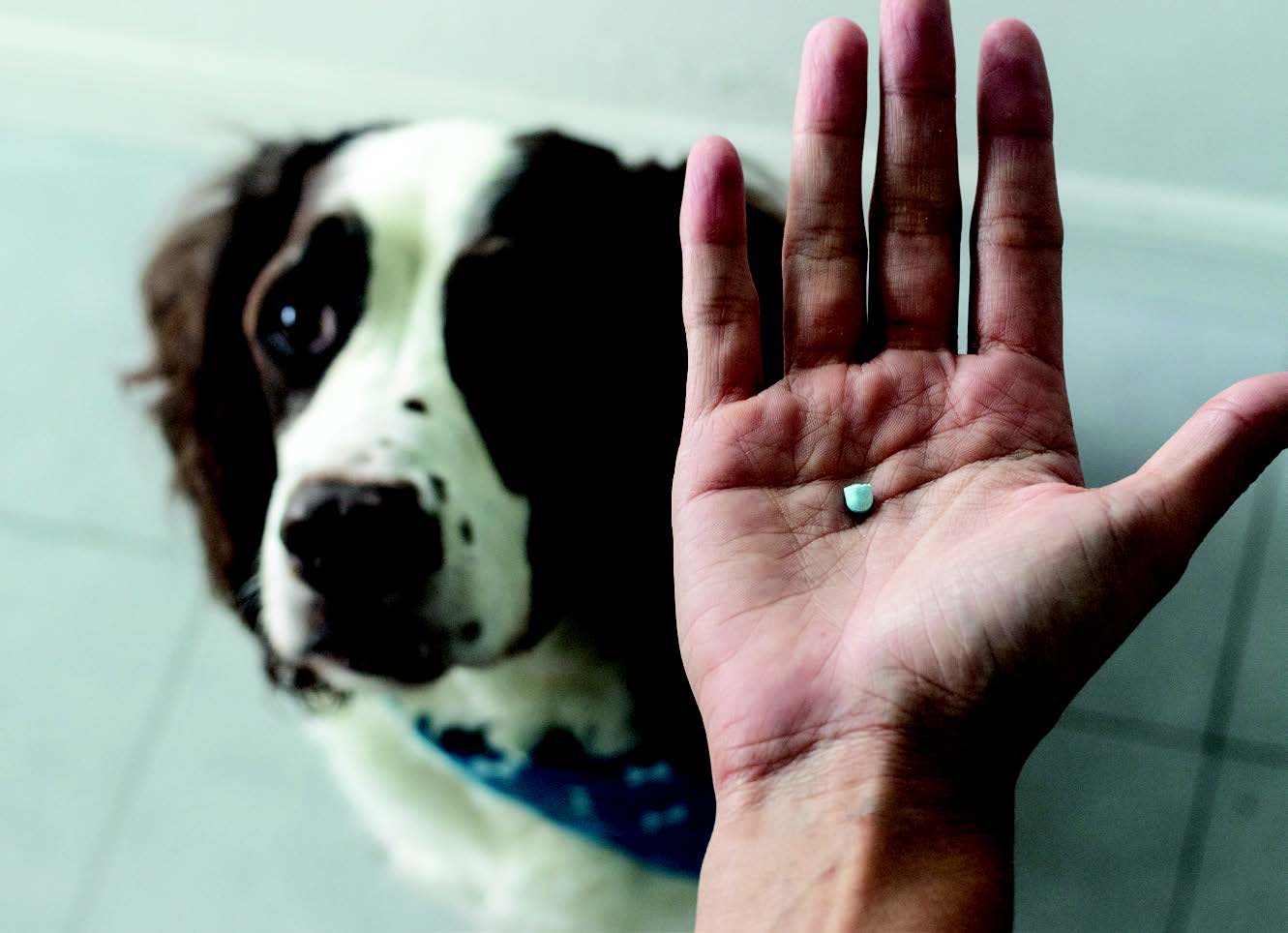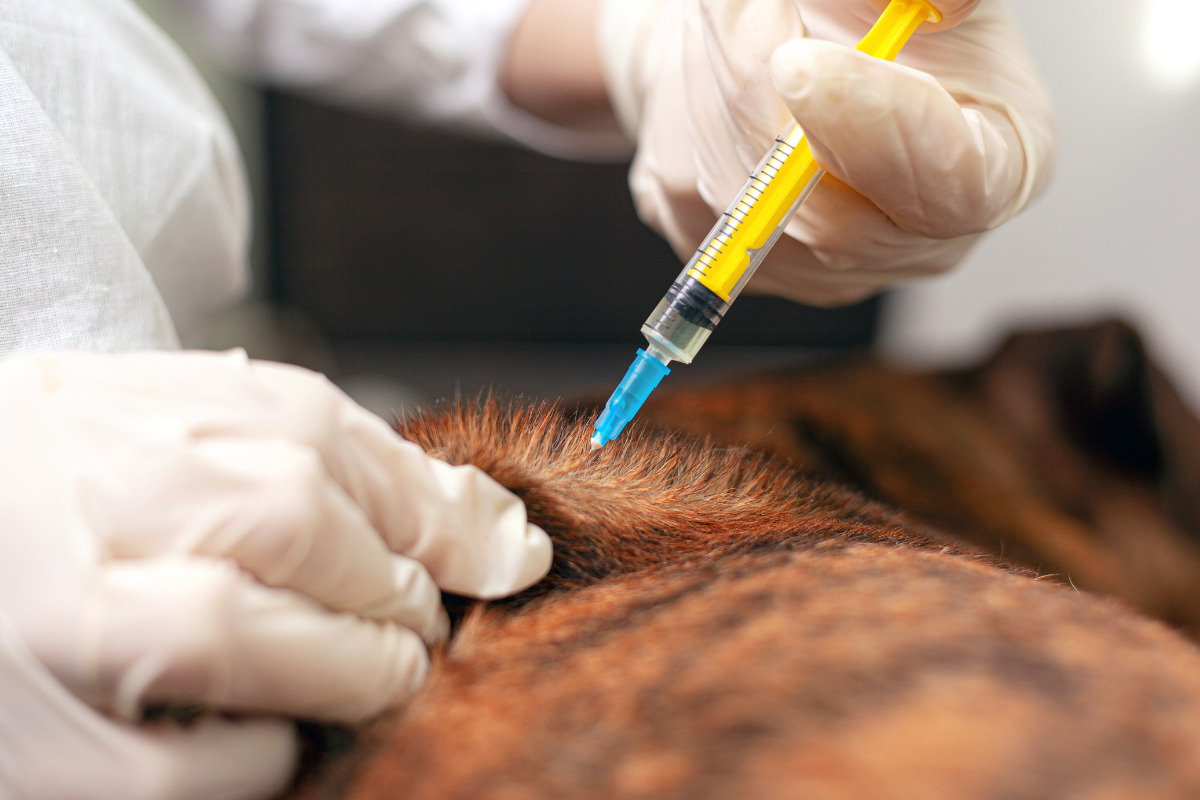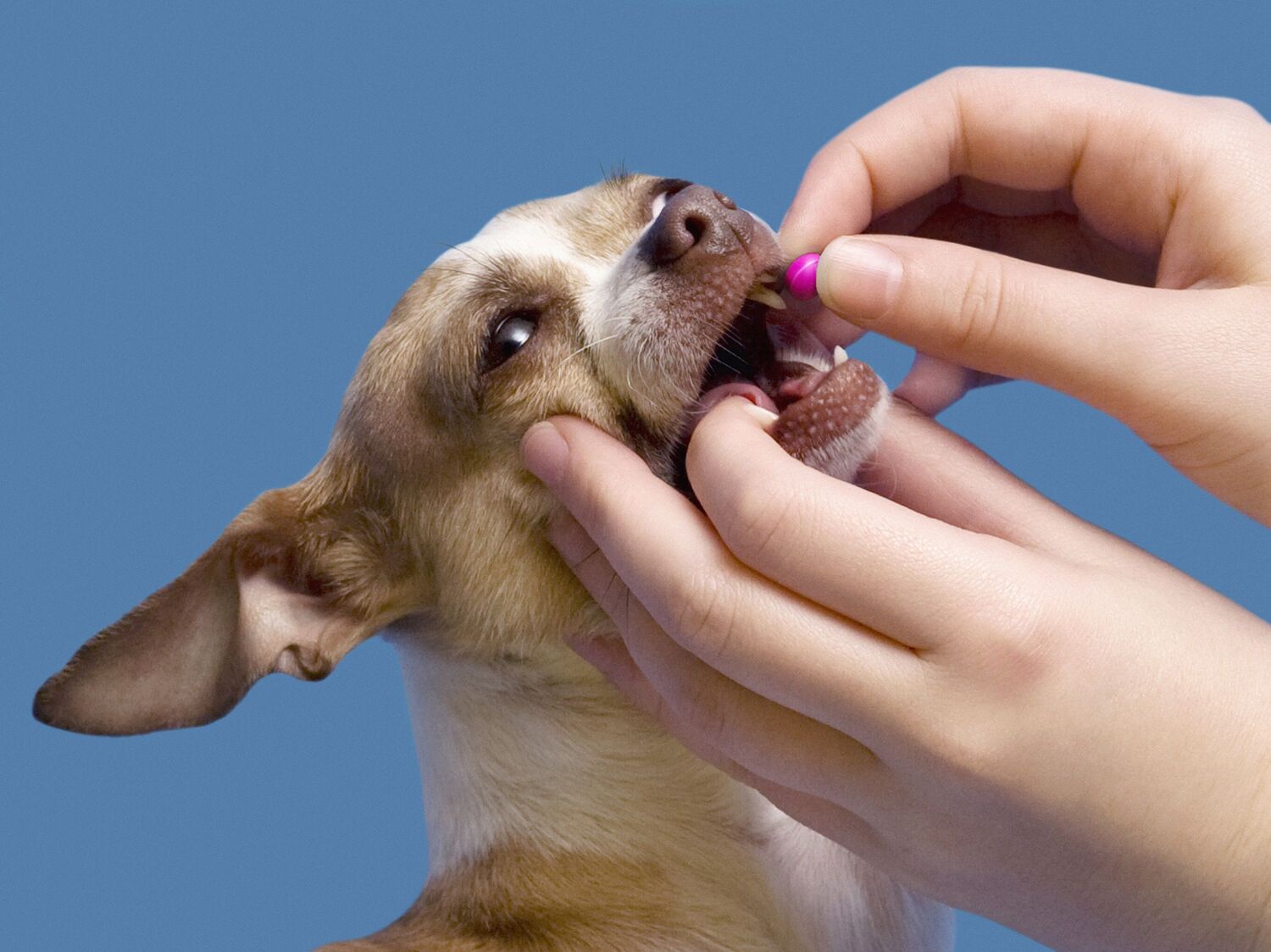Home>Health & Wellness>Common Health Issues>Heart Health>How Much Doxycycline For A Heartworm Positive Dog?


Heart Health
How Much Doxycycline For A Heartworm Positive Dog?
Published: February 7, 2024
Learn about the appropriate dosage of doxycycline for heartworm-positive dogs and how it contributes to their heart health. Discover the recommended treatment for heartworm-positive dogs.
(Many of the links in this article redirect to a specific reviewed product. Your purchase of these products through affiliate links helps to generate commission for Pawsomeoldies.com, at no extra cost. Learn more)
Table of Contents
Introduction
Heartworm disease is a serious and potentially fatal condition that can affect our beloved canine companions. It is caused by the parasitic worm Dirofilaria immitis, which is transmitted through the bite of an infected mosquito. Once inside a dog's body, these worms can grow and multiply, eventually causing damage to the heart, lungs, and blood vessels.
Understanding the importance of preventing and treating heartworm disease is crucial for the well-being of our furry friends. While prevention is the best approach, some dogs unfortunately become infected with heartworms. In such cases, it is essential to explore the available treatment options to provide the best possible care for our canine companions.
In this article, we will delve into the treatment of heartworm-positive dogs, with a specific focus on the use of doxycycline as part of the treatment protocol. Doxycycline, a versatile antibiotic, has shown promise in aiding the treatment of heartworm-positive dogs when used in conjunction with other medications. We will explore the role of doxycycline in combating heartworm disease and discuss its dosage and potential side effects.
By gaining a deeper understanding of the role of doxycycline in the treatment of heartworm-positive dogs, we can equip ourselves with the knowledge needed to make informed decisions about the health and well-being of our canine companions. Let's embark on this insightful journey to uncover the significance of doxycycline in the fight against heartworm disease in dogs.
Read more: How Much Is The Heartworm Shot For Dogs?
Understanding Heartworm Disease
Heartworm disease is a potentially life-threatening condition that primarily affects dogs, although it can also occur in other animals, such as cats and ferrets. The disease is caused by the parasitic worm Dirofilaria immitis, which is transmitted through the bite of infected mosquitoes. When an infected mosquito bites a dog, it deposits microscopic heartworm larvae onto the skin, which then enter the dog's body through the mosquito's bite wound.
Once inside the dog's body, the heartworm larvae migrate through the tissues and eventually reach the heart and adjacent blood vessels, where they mature into adult worms. These adult worms can grow up to a foot in length and can live for several years within the host animal. As the worms multiply and grow, they can cause severe damage to the heart, lungs, and blood vessels, leading to a range of health issues and potentially fatal consequences.
The presence of adult heartworms in a dog's body can lead to a variety of symptoms, including coughing, difficulty breathing, fatigue, and in severe cases, heart failure. If left untreated, heartworm disease can have devastating effects on a dog's health and well-being.
Preventing heartworm disease is crucial, and there are effective preventive medications available to protect dogs from becoming infected. However, in cases where prevention measures have not been implemented, or have not been entirely effective, dogs can become infected with heartworms. In such instances, prompt and appropriate treatment is essential to mitigate the impact of the disease and improve the affected dog's prognosis.
Understanding the transmission, progression, and potential consequences of heartworm disease is fundamental in recognizing the importance of preventive measures and timely treatment. By gaining insight into the nature of this disease, pet owners and caregivers can take proactive steps to safeguard their canine companions from the devastating effects of heartworm infection.
Treatment Options for Heartworm Positive Dogs
When a dog is diagnosed with heartworm disease, it is crucial to explore the available treatment options to address the infection and minimize the potential harm caused by the parasitic worms. The treatment of heartworm-positive dogs typically involves a comprehensive approach aimed at eliminating the adult worms, controlling the associated inflammation and damage, and supporting the dog's recovery.
One of the primary treatment options for heartworm-positive dogs involves the use of medications designed to kill the adult worms. These medications, known as adulticidal drugs, work to eliminate the mature heartworms from the dog's body. Additionally, supportive care and medications to manage the associated symptoms, such as coughing and respiratory distress, are often incorporated into the treatment plan.
The treatment protocol for heartworm-positive dogs may also include the use of preventive medications to protect the dog from developing new heartworm infections during the treatment process. This preventive measure is essential to prevent further complications and ensure the dog's overall well-being.
In some cases, surgical intervention may be necessary to remove the adult worms from the heart and blood vessels, especially in severe or advanced cases of heartworm disease. This surgical approach, known as adulticide removal, aims to directly extract the adult worms from the affected areas, reducing the burden on the dog's cardiovascular system and facilitating the recovery process.
It is important to note that the treatment of heartworm-positive dogs requires careful monitoring and follow-up to assess the dog's response to the treatment, manage any potential complications, and ensure the successful elimination of the heartworm infection. Regular veterinary examinations and diagnostic tests are essential components of the treatment process to evaluate the dog's progress and adjust the treatment plan as needed.
By considering the available treatment options and working closely with veterinary professionals, pet owners and caregivers can provide the best possible care for heartworm-positive dogs. The comprehensive approach to treatment, encompassing adulticidal drugs, supportive care, preventive measures, and potential surgical intervention, aims to address the multifaceted nature of heartworm disease and improve the affected dog's quality of life.
Understanding the treatment options available for heartworm-positive dogs empowers pet owners and caregivers to make informed decisions about the care and well-being of their canine companions. By prioritizing the timely and appropriate treatment of heartworm disease, we can strive to safeguard the health and happiness of our beloved dogs.
Doxycycline as a Treatment for Heartworm Positive Dogs
Doxycycline, a versatile antibiotic, has emerged as a valuable component in the treatment of heartworm-positive dogs. While it is not an adulticidal drug designed to directly eliminate the mature heartworms, doxycycline plays a crucial role in addressing certain aspects of the heartworm infection that can impact the overall treatment outcome.
One of the key contributions of doxycycline in the treatment of heartworm-positive dogs is its ability to target a type of bacteria called Wolbachia, which resides within the heartworms. Wolbachia is an endosymbiotic bacterium that lives in a mutualistic relationship with the heartworms, aiding in their survival and reproduction. However, the presence of Wolbachia can also contribute to the inflammatory response and tissue damage associated with heartworm infection. By targeting and reducing the population of Wolbachia through the administration of doxycycline, the inflammatory response triggered by the heartworms can be mitigated, potentially reducing the severity of the associated symptoms and complications.
Furthermore, the use of doxycycline as part of the treatment protocol for heartworm-positive dogs has been associated with improved outcomes during the adulticidal treatment phase. By addressing the inflammatory and immune-modulating effects of Wolbachia, doxycycline can create a more favorable environment for the subsequent administration of adulticidal drugs. This synergistic approach aims to enhance the efficacy of adulticidal treatment and improve the overall success rate of eliminating the mature heartworms from the dog's body.
In addition to its impact on Wolbachia, doxycycline has been recognized for its anti-inflammatory properties, which can contribute to reducing the severity of the inflammatory response triggered by the presence of heartworms. By mitigating the inflammatory cascade, doxycycline can help alleviate the associated symptoms and provide a more favorable environment for the dog's recovery.
The incorporation of doxycycline into the treatment regimen for heartworm-positive dogs underscores the multifaceted nature of addressing the infection and its associated complications. While doxycycline does not directly eliminate the adult heartworms, its targeted actions against Wolbachia and its anti-inflammatory properties contribute to a comprehensive approach to managing the impact of heartworm disease on the affected dogs.
By recognizing the significance of doxycycline in the treatment of heartworm-positive dogs, pet owners and caregivers can gain a deeper understanding of the comprehensive treatment protocol and its potential benefits for the affected canine companions. The strategic use of doxycycline as part of the treatment plan reflects the ongoing efforts to optimize the care and outcomes for dogs battling heartworm disease.
The role of doxycycline in the treatment of heartworm-positive dogs exemplifies the intricate and evolving landscape of veterinary medicine, where diverse therapeutic modalities are harnessed to address complex health challenges. As we continue to expand our knowledge and refine our approaches to managing heartworm disease, the inclusion of doxycycline stands as a testament to the ongoing pursuit of enhancing the well-being of our cherished canine companions.
Dosage of Doxycycline for Heartworm Positive Dogs
The dosage of doxycycline for heartworm-positive dogs is a critical aspect of the treatment protocol, as it directly influences the effectiveness and safety of the medication regimen. When incorporating doxycycline into the treatment plan for heartworm-positive dogs, veterinary professionals carefully consider the appropriate dosage based on the dog's weight, overall health status, and the specific goals of the treatment.
Typically, the dosage of doxycycline for heartworm-positive dogs is determined based on a weight-based calculation, ensuring that the medication is administered at an optimal level to achieve the desired therapeutic effects. The dosage may vary depending on the severity of the heartworm infection and the presence of any concurrent health conditions that may impact the dog's response to the medication.
In general, the standard dosage of doxycycline for heartworm-positive dogs ranges from 5 to 10 mg per kilogram of the dog's body weight, administered orally once or twice daily. This dosage regimen is designed to achieve adequate levels of doxycycline in the dog's system, allowing the medication to exert its targeted effects on Wolbachia and the inflammatory response associated with heartworm infection.
The duration of the doxycycline treatment may also vary based on the specific treatment protocol recommended by the attending veterinarian. In some cases, doxycycline may be administered for a period of several weeks leading up to the initiation of adulticidal treatment, while in other instances, it may be continued throughout the adulticidal phase to maximize its beneficial effects.
It is essential for pet owners and caregivers to strictly adhere to the prescribed dosage and administration schedule provided by the veterinarian, ensuring that the dog receives the appropriate amount of doxycycline to support the treatment of heartworm disease. Additionally, close monitoring of the dog's response to the medication and any potential side effects is crucial to optimize the treatment outcomes and minimize any adverse reactions.
By understanding the dosage considerations for doxycycline in the context of treating heartworm-positive dogs, pet owners and caregivers can actively participate in the treatment process and contribute to the overall well-being of their canine companions. The precise and tailored administration of doxycycline underscores the commitment to delivering comprehensive and individualized care to dogs affected by heartworm disease.
The dosage of doxycycline for heartworm-positive dogs represents a pivotal component of the treatment strategy, reflecting the meticulous approach taken to address the complexities of heartworm infection and optimize the chances of a successful outcome for the affected dogs. As veterinary medicine continues to advance, the emphasis on tailored dosing regimens underscores the ongoing dedication to enhancing the health and quality of life for our cherished canine companions.
Potential Side Effects of Doxycycline Treatment
While doxycycline is a valuable component in the treatment of heartworm-positive dogs, it is essential to be mindful of the potential side effects associated with its administration. Understanding these side effects can empower pet owners and caregivers to monitor their canine companions effectively and seek prompt veterinary attention if any adverse reactions occur.
One of the common side effects of doxycycline treatment in dogs is gastrointestinal upset. This may manifest as symptoms such as vomiting, diarrhea, or decreased appetite. Dogs receiving doxycycline may experience mild to moderate gastrointestinal disturbances, which can impact their overall well-being and comfort. It is important for pet owners to observe their dogs closely during the course of doxycycline treatment and report any gastrointestinal issues to the veterinarian.
In some cases, dogs may exhibit signs of allergic reactions to doxycycline, presenting as itching, hives, facial swelling, or difficulty breathing. Allergic reactions to medications should be taken seriously, and immediate veterinary attention is necessary if such symptoms are observed. Monitoring the dog for any signs of allergic responses is crucial, and prompt intervention can prevent the escalation of allergic reactions.
Another potential side effect of doxycycline in dogs is the increased sensitivity to sunlight, known as photosensitivity. Dogs undergoing doxycycline treatment may experience heightened skin sensitivity to sunlight, leading to sunburn or skin irritation upon exposure to UV rays. As a precautionary measure, limiting the dog's sun exposure during doxycycline treatment can help mitigate the risk of photosensitivity-related issues.
Furthermore, the prolonged use of doxycycline in dogs has been associated with the potential for adverse effects on the gastrointestinal and renal systems. While these effects are less common, they underscore the importance of closely monitoring the dog's overall health and well-being during the course of doxycycline treatment. Any unusual symptoms or changes in the dog's behavior should be promptly reported to the veterinarian for further evaluation.
It is crucial for pet owners and caregivers to maintain open communication with the veterinary team throughout the doxycycline treatment process, reporting any observed side effects or concerns. By remaining vigilant and proactive, pet owners can contribute to the safe and effective management of doxycycline treatment for their heartworm-positive dogs.
In summary, while doxycycline is a valuable adjunct in the treatment of heartworm-positive dogs, it is important to be aware of the potential side effects it may pose. By recognizing and addressing these potential side effects, pet owners and caregivers can play a proactive role in ensuring the well-being and comfort of their canine companions during the course of doxycycline treatment.
Conclusion
In conclusion, the treatment of heartworm-positive dogs necessitates a multifaceted approach aimed at addressing the complex nature of the infection and its associated complications. The inclusion of doxycycline as part of the treatment protocol underscores the evolving landscape of veterinary medicine, where diverse therapeutic modalities are harnessed to optimize the care and outcomes for dogs battling heartworm disease.
Doxycycline, while not an adulticidal drug, plays a pivotal role in targeting the Wolbachia bacteria associated with heartworms, thereby mitigating the inflammatory response and creating a more favorable environment for subsequent adulticidal treatment. Its anti-inflammatory properties further contribute to alleviating the severity of symptoms and supporting the dog's recovery.
The dosage of doxycycline for heartworm-positive dogs is carefully tailored to ensure optimal therapeutic effects while minimizing potential side effects. Close adherence to the prescribed dosage and administration schedule, coupled with vigilant monitoring, is essential to maximize the benefits of doxycycline treatment and safeguard the well-being of the affected dogs.
However, it is crucial for pet owners and caregivers to be mindful of the potential side effects associated with doxycycline treatment, such as gastrointestinal upset, allergic reactions, and photosensitivity. By recognizing and addressing these potential side effects, pet owners can actively contribute to the safe and effective management of doxycycline treatment for their heartworm-positive dogs.
The comprehensive treatment of heartworm-positive dogs, encompassing adulticidal drugs, supportive care, preventive measures, and potential surgical intervention, reflects the commitment to delivering individualized and holistic care to dogs affected by heartworm disease. By understanding the significance of doxycycline in this treatment paradigm, pet owners and caregivers can make informed decisions about the care and well-being of their canine companions, ultimately striving to enhance the health and happiness of their beloved dogs.
As veterinary medicine continues to advance, the integration of doxycycline into the treatment of heartworm-positive dogs exemplifies the ongoing dedication to refining treatment strategies and optimizing outcomes for dogs facing the challenges of heartworm disease. Through collaborative efforts between pet owners, caregivers, and veterinary professionals, the fight against heartworm disease in dogs remains steadfast, driven by a shared commitment to providing the best possible care for our cherished canine companions.














